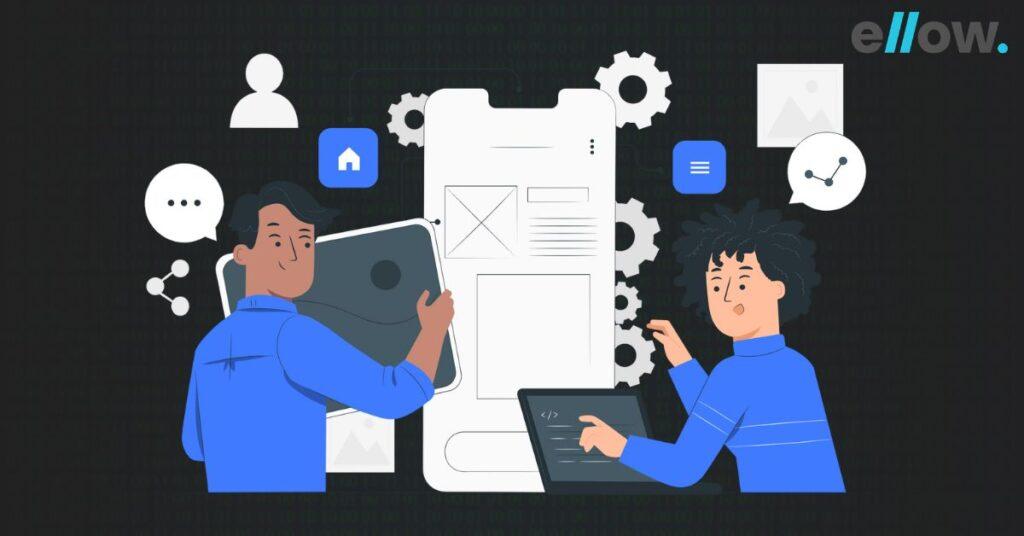
Let’s build the future together.
Great ideas need great people. Partner with us to bring your vision to life, or take the first step in your career by joining our team of innovators.

The characteristics of software play a critical role in determining its success and impact. Whether it’s a mobile app, a web application, or an enterprise software solution, understanding and prioritizing these characteristics are vital to creating high-quality software that fulfills the requirements.
This blog will widen your perspective on software development by defining its meaning, scope, and characteristics.
Software characteristics are the key qualities that define the behavior, performance, and usability of software. These characteristics evaluate and measure the holistic quality of software systems.
By understanding the importance of these characteristics, software engineers can make informed decisions and trade-offs during the development process to deliver successful software solutions.

Software has become an integral part of our lives in this tech-driven world.
Its global business market has a valuation of USD 474.61 billion and is expected to rise at a CAGR of 11.9% from 2023 to 2030.
From apps to web applications and complex enterprise systems, software plays a pivotal role in enabling businesses and individuals to achieve their goals.
Behind every successful software solution lies the discipline of software engineering. Software engineers collaborate with stakeholders, including clients, designers, and quality assurance professionals, to ensure the best quality delivery. They also play an integral part in testing and debugging software to identify and fix any issues that may arise.
It accommodates the approach of designing, developing, testing, and maintaining systems. It fuses with rules and regulations from computer science, mathematics, and engineering to create high-quality software that submits to the goal.
Software engineers apply their expertise in various areas such as coding, software architecture, project management, and quality assurance to ensure the successful delivery of software solutions. They are the architects of the digital world with a deep understanding of programming languages, algorithms, and software development methodologies.
Software engineering follows a structured approach known as the software development lifecycle (SDLC). This encompasses several phases, including requirements gathering, system design, implementation, testing, deployment, and maintenance.
Each phase of the SDLC involves specific activities and deliverables, ensuring that the software development process is organized and well-managed.
By adhering to the SDLC, software engineers can systematically plan, develop, and deliver software solutions that meet user expectations and business objectives.
Functionality is the primary characteristic of software that determines its ability to perform the tasks or functions it is designed for.
It involves the features, capabilities, and behaviors that enable users to accomplish their goals using the software or mobile app. It should meet the specified requirements and provide the desired functionality to address user needs effectively.
By focusing on functionality, software engineers can ensure that the software aligns with its intended purpose and delivers value to its users.
Usability refers to how easily and efficiently users can interact with the software to achieve their objectives. A user-friendly interface, intuitive navigation, and clear instructions contribute to the usability of the software.
By considering the target users and their needs, software engineers can design interfaces that are intuitive, visually appealing, and easy to navigate. Good usability enhances user satisfaction, reduces training time, and increases productivity, ultimately leading to the software’s success.
Efficiency is a crucial characteristic that measures how well the software utilizes system resources to perform its functions. Efficient software executes tasks promptly and utilizes minimal system resources such as CPU, memory, and disk space.
Optimized algorithms, proper memory management, and effective resource utilization contribute to efficient software. By focusing on efficiency, software engineers can improve user experience, reduce system bottlenecks, and optimize resource usage, ultimately leading to better performance and cost-effectiveness.
Flexibility is the ever-evolving technological landscape. In today’s dynamics, software needs to be flexible to meet changing user requirements, incorporate new features, and integrate with other systems.
Well-designed software with a modular architecture and flexible components allows for easier modifications and enhancements. Flexibility reduces the risk of software becoming obsolete and ensures that it can evolve with the changing needs of users and the market.
Reliability is a critical characteristic that ensures the software’s ability to perform consistently and accurately under various conditions.
Reliable software minimizes the occurrence of errors, crashes, or unexpected behavior. Users rely on software to work as intended, and any unexpected downtime or data loss can have severe consequences.
By focusing on reliability, software engineers can build robust and resilient software that can handle errors gracefully, recover from failures, and provide a dependable user experience.
Maintainability is the ease with which software can be modified, debugged, and enhanced throughout its lifecycle.
Well-maintained software is easier to fix, update, and adapt to changing requirements. This characteristic includes writing clean and modular code, providing comprehensive documentation, and following well-defined development practices.
By prioritizing maintainability, software engineers can reduce the time and effort required for maintenance, ensure the longevity of the software, and facilitate collaboration among development teams.
Portability refers to the software’s ability to run on different platforms or environments without significant modifications.
With the increasing diversity of devices and operating systems, software developers must ensure that their applications can be easily deployed and executed across various platforms. Portable software enables wider adoption, reduces development costs, and allows users to choose the platform that best suits their needs.
By considering portability during software development, engineers can create software that reaches a broader audience and remains adaptable to future technological changes.
Data integrity is one aspect that involves maintaining the accuracy and consistency of data throughout its cycle. By ensuring data integrity, software engineers can guarantee that the information processed and stored by the software remains reliable and trustworthy.
Implementation of such mechanisms is essential to ensure data prevention and corruption – error-checking algorithms, checksums, and data validation techniques.
They must focus on its security aspects. This involves adaptation of robust security measures to protect the software and its data from unauthorized access, modification, or theft.
Encryption techniques, access controls, and authentication mechanisms can be employed to safeguard sensitive information and maintain the integrity of the software system.
By incorporating these security measures, software engineers can ensure that the software remains secure and resistant to external threats.
Furthermore, integrity also encompasses the reliable operation of the software itself. Software engineers should strive to build systems that consistently behave as intended, without unexpected errors or malfunctions.
Rigorous testing and quality assurance practices can help identify and rectify any bugs or vulnerabilities that could compromise the integrity of the software.
By ensuring the reliability of the software, engineers can provide users with a consistent and dependable experience, reinforcing trust and confidence in the software solution.
The characteristics of software play a vital role in software engineering, shaping the development, performance, and user experience of software systems. Functionality, usability, efficiency, flexibility, reliability, maintainability, portability, and integrity are key characteristics that software engineers should consider throughout the development lifecycle.
By focusing on these characteristics, engineers can create software solutions that meet user needs, provide a seamless user experience, and adapt to evolving requirements.
Software engineering is an iterative process, and understanding these characteristics empowers engineers to make informed decisions and deliver high-quality software solutions that drive innovation and improve our lives.
Great ideas need great people. Partner with us to bring your vision to life, or take the first step in your career by joining our team of innovators.
Looking to build your career in development? team@ellow.io